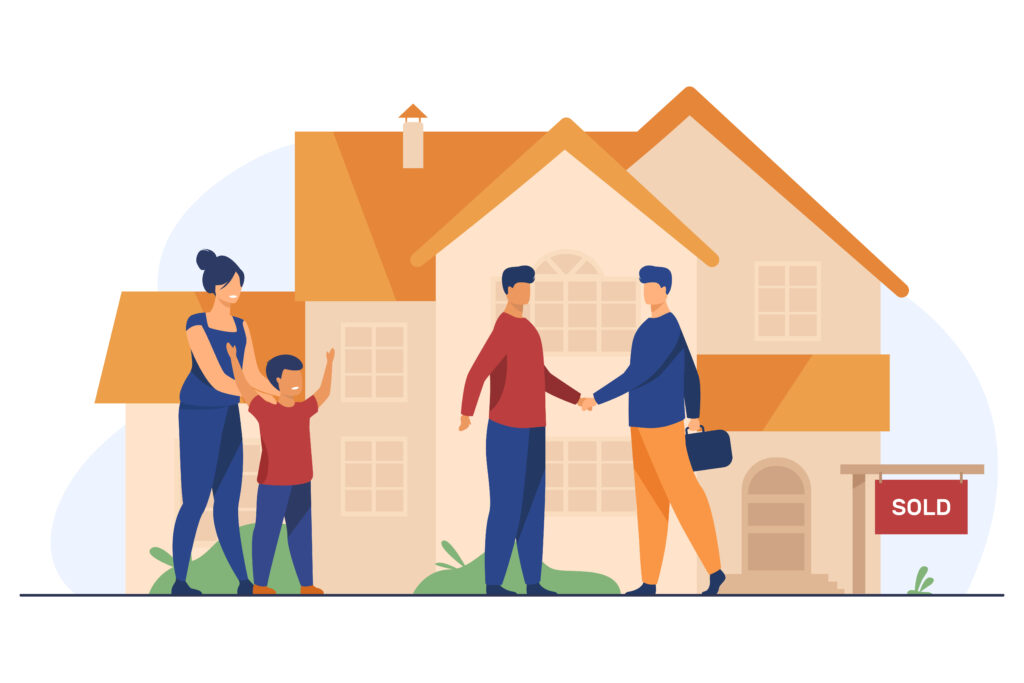Easy 5 Step First Time Home Buyer Guide
Learn everything you need to know to feel confident as a first time home buyer
Published December 18th, 2022

First-Time Home Buyer Loans – Everything you Must Know
If you’re a first-time home buyer, there are many decisions to make, and they can feel scary. A house is a big commitment, and one mistake can cost a lot of money. The good news is that first-time buyers have a lot of programs and advantages, making it easier to secure your first home.
It’s not as hard as most people think to buy your first home. Check out our guide on buying a house as a first-time buyer to see how easy it is.
The Advantages of Being a First-Time Homebuyer
You might think you’re at a disadvantage as a first-time home buyer because you don’t have profits from a home to use as a down payment.
Here’s the good news.
There are several down payment assistance programs for first-time buyers and several government-backed loan programs that make it easy to get approved. These programs may help you get the down payment, cover your closing costs, or provide flexible underwriting guidelines.
What is a First-Time Homebuyer?
You might think a first-time homebuyer has never owned a home, but other circumstances qualify you as a first-timer.
- You haven’t owned a home in three years.
- You owned a home with a spouse but are now divorced and want to buy a home.
- You owned a mobile home not permanently affixed to the ground.
How to Determine if you’re Ready to Buy a Home
If you fit the bill as a first-time buyer, it’s important to check your qualifying factors to see if you’re ready to buy a home. Here’s what to consider.
How’s your Credit?
If you use government-backed financing, you don’t need perfect credit, but the higher your credit score is, the easier it is to qualify.
Check your credit reports and see if you need to fix anything. These reports show your credit history, not your score, but your history makes up your score. For example, consider fixing late payments, overextended credit lines, or outstanding collections before applying for a loan.
Do you Have any Savings?
You’ll need money for a down payment and closing costs. Figure you’ll need around 3.5% of the sales price for a down payment and 3% – 5% of the loan amount for closing costs.
Don’t worry if you haven’t saved enough money; there are down payment assistance programs and help for closing costs. However, some money saved will increase your chances of approval.
What can you Afford?
Deciding how much you think you can afford is a good idea, but a lender can give you an official answer.
Talk to a lender and get pre-qualified. This isn’t a formal process, and you don’t have to provide documentation to prove your income, assets, or credit. However, it gives you a ballpark figure of how much house you can afford before starting the process.
See how the number a lender provides fits into your budget. Never borrow more than you’re comfortable paying; always compare the payment to your budget and what you think you can afford.
Once you are happy with the answers to each question, you can start the process of buying a house. However, if you think you don’t have enough money saved or you need time to fix your credit, do it so you can get approved sooner rather than later.
The 5 Steps to Buying a House
It can feel overwhelming When you’re a first-time home buyer, but here are the steps to buying a house.
1. Get Pre-approved
When you’re ready to look at homes, take your prequalification one step further and get pre-approved. A pre-approval is an underwriting process. You’ll complete a loan application and provide the lender with the following documents:
- Paystubs covering the last 30 days
- W-2s for the last two years
- Tax returns for the last two years if you’re self-employed
- Last two months of bank statements
- Proof of employment
A pre-approval letter will state how much home you can afford, including the loan amount and down payment. It will also include any conditions you must satisfy to close the loan.
The pre-approval letter is your foot in the door with sellers and gives you the edge on the competition if there’s a bidding war.
2. Find a Home
With the pre-approval letter, you’re ready to look at homes. First, consider creating a list of must-have features in a home, so you keep your wits about you when looking at homes. It’s easy to get emotionally involved and make rash decisions. Instead, stick to your list and budget to make the right choice.
3. Make an Offer
After finding a home, it’s time to make an offer. Again, you might have some back-and-forth negotiations. Having a reputable real estate agent help you with this step is best. Buyers don’t pay the real estate agent anything, so it’s best to use one.
4. Finalize the Sale
If the seller accepts your offer, you’ll complete the underwriting process. This means satisfying any conditions on your pre-approval letter. The underwriter will also order the title and appraisal on the property.
The underwriter’s job is to ensure you’re financially fit to afford the home and that the home is satisfactory collateral. The appraised value must be at least as much as the sales price, and the title must be free of liens.
5. Close the Loan
The final step is to close your loan. This is when money exchanges hands from you, outside resources, and the lender. The seller receives their funds, and you receive the keys to your new home.
First-Time Home Buyer Loans and Assistant Programs
Here are some of the most popular options if you’re wondering how you’ll get approved for first-time home buyer loans.
Government-Backed Loans
Government-backed loans have flexible guidelines because they have a government guarantee. If a buyer defaults, the government agency pays the lender back a portion of the lost funds.
The FHA first-time home buyers loans are the most popular government-backed option, but there are also VA and USDA loans with relaxed credit score guidelines and low down payment requirements. However, they still offer competitive rates and terms, making buying your first home easy.
HomePath ® by Fannie Mae
The Fannie Mae HomePath® program is great for first-time home buyers looking for affordable homes. The homes listed on the Fannie Mae HomePath® site are foreclosed homes that Fannie Mae owns. You can buy them at discounted prices, and if you qualify, get assistance with up to 3% of your closing costs and competitive rates and terms with a HomeReady Mortgage putting as little as 3% down.
Good Neighbor Next Door
The Good Neighbor Next Door program is a HUD program for those serving our community, such as teachers, police officers, firefighters, and paramedics.
Public service professionals have access to HUD-owned homes at a 50% discount. The properties are in areas that need revitalizing. The home comes with a ‘silent’ second mortgage for 50% of the sales price. HUD dismisses the second mortgage if you live in the home as your primary residence for three years. After the three years, you can keep, sell or even rent out the property.
Charitable Programs
Many states and local communities have charitable programs that help low-income first-time home buyers own a home. A few examples include the following:
- Habitat for Humanity
- Neighborhood Assistance Corporation of America
- State and local community-specific charities
Tips to Increase your Chances of Approval
As a first-time homebuyer, there are many decisions and hurdles to cross. So here are some tips to maximize your chances of approval.
- Work on your credit 6 – 12 months before applying for a mortgage. Check your credit early, fix any issues, and continue with your good credit habits to maximize your chances of approval.
- Save as much as possible for the down payment and closing costs. Any ‘skin in the game’ you have when buying a home, the higher your chances of approval become.
- Create a budget that allows room for a mortgage. If you have a lot of credit card debt, work it into your budget to pay it off before applying for a mortgage. The lower your debt-to-income ratio is, the easier it is to get approved.
- Consider housing counseling. Many home loan programs for first-time home buyers offer housing counseling. This helps you understand how to qualify for a mortgage, the assistance options available, and how to maintain your mortgage and keep your home.
Final Thoughts
If you’re a first-time homebuyer, you have many more options than you might realize. The key is working with a lender who understands your needs and will help you find the perfect program.
You don’t need a 20% down payment or perfect credit like many people mistakenly believe. Instead, with the right steps, a little saved money, and fair credit, you can find yourself owning your first home much faster than you thought possible.
Take the next step and get a pre-qualification in minutes
NMLS: 75243 | Privacy Policy |
Copyright 2022 PRMG All Rights Reserved.
Directtolender website is in compliance with web content accessibility guidelines 2.1 WCAG 2.1 at the AA level, published by the world wide web consortium (W3C)
- 754-237-7173
- 1265 Corona Pointe Ct Suite 301, Corona, CA 92879

